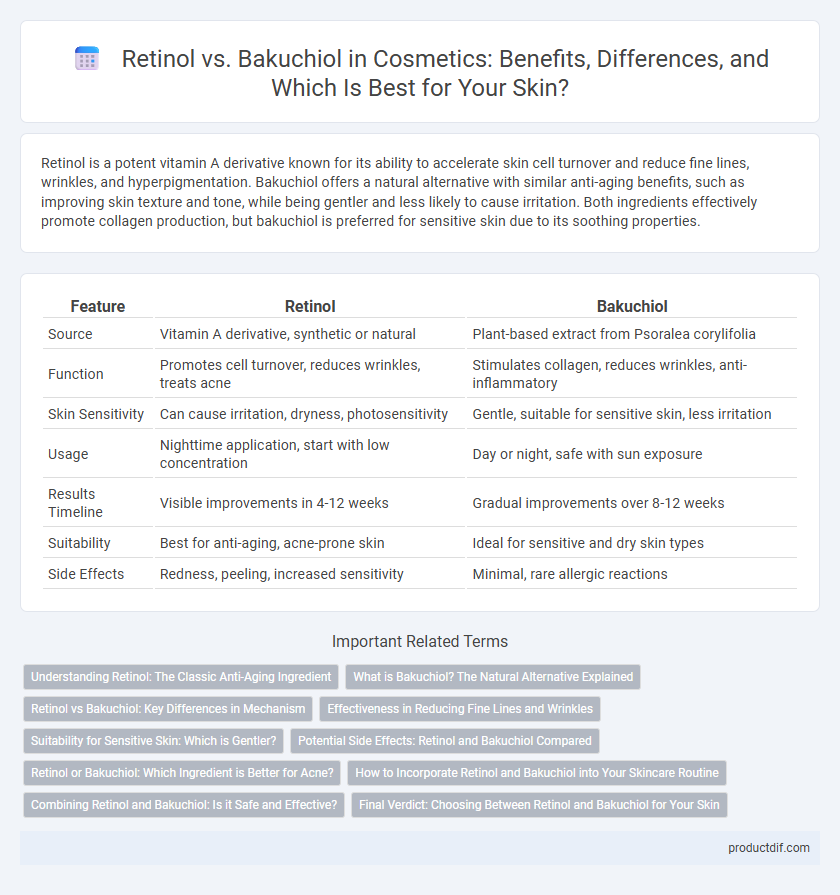Retinol is a potent vitamin A derivative known for its ability to accelerate skin cell turnover and reduce fine lines, wrinkles, and hyperpigmentation. Bakuchiol offers a natural alternative with similar anti-aging benefits, such as improving skin texture and tone, while being gentler and less likely to cause irritation. Both ingredients effectively promote collagen production, but bakuchiol is preferred for sensitive skin due to its soothing properties.
Table of Comparison
| Feature | Retinol | Bakuchiol |
|---|---|---|
| Source | Vitamin A derivative, synthetic or natural | Plant-based extract from Psoralea corylifolia |
| Function | Promotes cell turnover, reduces wrinkles, treats acne | Stimulates collagen, reduces wrinkles, anti-inflammatory |
| Skin Sensitivity | Can cause irritation, dryness, photosensitivity | Gentle, suitable for sensitive skin, less irritation |
| Usage | Nighttime application, start with low concentration | Day or night, safe with sun exposure |
| Results Timeline | Visible improvements in 4-12 weeks | Gradual improvements over 8-12 weeks |
| Suitability | Best for anti-aging, acne-prone skin | Ideal for sensitive and dry skin types |
| Side Effects | Redness, peeling, increased sensitivity | Minimal, rare allergic reactions |
Understanding Retinol: The Classic Anti-Aging Ingredient
Retinol, a derivative of vitamin A, is renowned for its powerful anti-aging properties, promoting skin cell turnover and stimulating collagen production to reduce fine lines and wrinkles. This classic ingredient also improves skin texture and tone by accelerating exfoliation and enhancing cellular regeneration. Despite its effectiveness, retinol can cause irritation or sensitivity, making gradual introduction and proper sun protection essential for optimal results.
What is Bakuchiol? The Natural Alternative Explained
Bakuchiol is a plant-based compound extracted from the seeds and leaves of the Psoralea corylifolia plant, offering a natural alternative to retinol for skincare. It provides anti-aging benefits by stimulating collagen production and reducing fine lines without the irritation commonly associated with retinol. Bakuchiol's antioxidant and anti-inflammatory properties make it suitable for sensitive skin, promoting smoother, firmer, and more radiant complexion.
Retinol vs Bakuchiol: Key Differences in Mechanism
Retinol, a vitamin A derivative, works by accelerating cell turnover and stimulating collagen production, effectively reducing fine lines and improving skin texture. Bakuchiol, a plant-based alternative, mimics retinol's effects by targeting similar cellular pathways but with antioxidant and anti-inflammatory properties, making it suitable for sensitive skin. Unlike retinol, bakuchiol does not increase skin photosensitivity and offers gentler exfoliation without irritation.
Effectiveness in Reducing Fine Lines and Wrinkles
Retinol, a derivative of vitamin A, is widely recognized for its potent ability to stimulate collagen production and accelerate cell turnover, effectively reducing fine lines and wrinkles over time. Bakuchiol, a plant-based alternative, mimics retinol's anti-aging benefits by promoting collagen synthesis and improving skin elasticity while being gentler on sensitive skin with minimal irritation. Clinical studies indicate that bakuchiol provides comparable efficacy to retinol in smoothing fine lines and wrinkles without the common side effects like dryness and redness.
Suitability for Sensitive Skin: Which is Gentler?
Bakuchiol is generally gentler than retinol, making it more suitable for sensitive skin due to its plant-based origin and lower risk of irritation. Retinol, a potent vitamin A derivative, often causes redness, dryness, and flaking, particularly in sensitive skin types. Dermatologists recommend bakuchiol as a calming alternative that delivers similar anti-aging benefits without the harsh side effects.
Potential Side Effects: Retinol and Bakuchiol Compared
Retinol can cause redness, dryness, peeling, and increased sensitivity to sunlight, especially during initial use or with higher concentrations. Bakuchiol is generally well-tolerated, with fewer reports of irritation and sensitivity, making it a suitable alternative for sensitive skin types. Both ingredients should be introduced gradually and paired with sunscreen to minimize adverse effects.
Retinol or Bakuchiol: Which Ingredient is Better for Acne?
Retinol, a vitamin A derivative, accelerates cell turnover and unclogs pores, making it highly effective for acne treatment, but it may cause irritation and sensitivity in some skin types. Bakuchiol, a natural alternative derived from Psoralea corylifolia, offers similar anti-inflammatory and antibacterial benefits without irritation, suitable for sensitive or dry skin. Choosing between retinol and bakuchiol depends on skin tolerance and acne severity, with dermatologists often recommending retinol for moderate to severe acne.
How to Incorporate Retinol and Bakuchiol into Your Skincare Routine
To effectively incorporate retinol and bakuchiol into your skincare routine, start by using retinol at night in small amounts, gradually increasing frequency to minimize irritation, while applying bakuchiol during the day as a gentler, antioxidant-rich alternative to support skin renewal. Pair retinol with a moisturizer to reduce dryness and always apply sunscreen in the morning to protect sensitive skin from UV damage. Bakuchiol can be layered with other hydrating serums and is suitable for sensitive skin types seeking anti-aging benefits without the typical retinol side effects.
Combining Retinol and Bakuchiol: Is it Safe and Effective?
Combining retinol and bakuchiol in a skincare routine can be safe and effective when introduced gradually to minimize irritation. Retinol, a vitamin A derivative, accelerates cell turnover and reduces wrinkles, while bakuchiol, a plant-based alternative, offers similar anti-aging benefits with less sensitivity. Using both allows for enhanced skin rejuvenation, balancing the potency of retinol with the gentler, antioxidant-rich properties of bakuchiol.
Final Verdict: Choosing Between Retinol and Bakuchiol for Your Skin
Choosing between retinol and bakuchiol depends on your skin type and sensitivity; retinol offers powerful anti-aging benefits with proven clinical results, while bakuchiol provides a gentler, plant-based alternative suitable for sensitive skin. Retinol promotes collagen production and accelerates cell turnover, ideal for reducing wrinkles and hyperpigmentation, whereas bakuchiol mimics retinol's effects without causing irritation or dryness. For optimal skincare, those with resilient skin may prefer retinol's effectiveness, whereas individuals with sensitive or reactive skin often benefit from bakuchiol's soothing properties.
Retinol vs Bakuchiol Infographic

 productdif.com
productdif.com